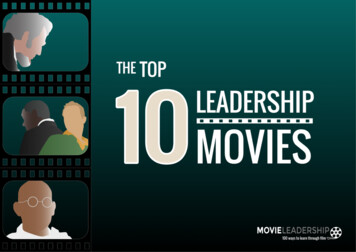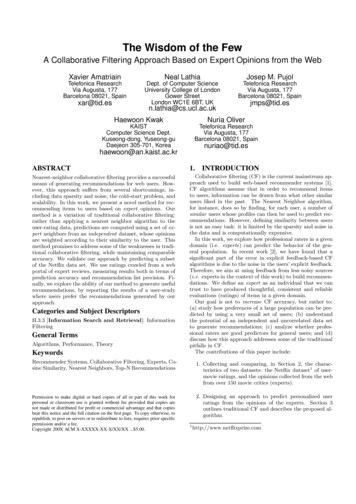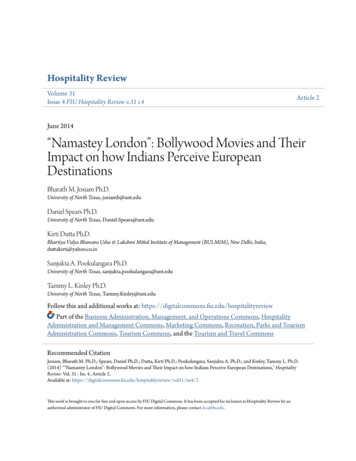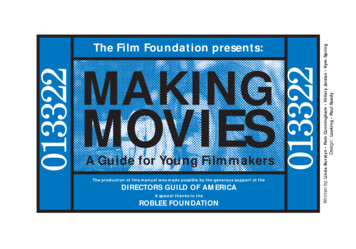
Transcription
www.movieleadership.com
CONTENTSINTRODUCTION . 3APOLLO 13 . 4COACH CARTER .5THIRTEEN DAYS .6INVICTUS .7THE SHAWSHANK REDEMPTION .8LINCOLN .912 ANGRY MEN .10MONEYBALL . 11GANDHI .1275 MOVIE SCENES WHICH HIGHLIGHT GREAT LEADERSHIP .13www.movieleadership.comwww.movieleadership.com
INTRODUCTIONMovies can be a great source of inspiration forleaders. It's amazing what you can learn aboutall aspects of leadership: from individual skillsand techniques, to the importance of valuesand behaviours.I’ve spent several years looking at a widevariety of movies from a leadershipperspective, and I’m frequently asked for mybest leadership movie. So here’s my top 10.Any list of top leadership movies is subjective,and mine is no different. So how have I comeup with my choices?I've tried to select a range of movies thathighlight different aspects of leadership.There are movies featuring true life leadershipicons (Invictus, Gandhi, Lincoln, Thirteen Days)and unlikely leaders with no formal authority(The Shawshank Redemption, 12 Angry Men).There are movies with leaders placed underextraordinary pressure (Apollo 13), andmovies depicting leadership of students andsports teams (Remember the Titans, CoachCarter).And in many of the selections, you can seeoutstanding leaders operating at manydifferent comOf course, it wasn't easy. There have beensome hard choices. It was a wrench to leaveout such leadership classics as Made inDagenham, Selma, Dead Poets Society,Hoosiers, Braveheart and many more. Formany Twelve O'Clock High is the classicleadership movie - the perfect example ofsituational leadership. In many ways I agree a hard one to leave out.Indeed, since the first edition of this shorteBook in 2013, I've made a change to mytop 10. Out goes Chicken Run, in comesLincoln. The latter simply demands inclusion:every time I watch it, I notice something newworth learning.So this is my choice as of today - but nodoubt it will change by tomorrow.I had fun making my selections and I hopeyou enjoy reading about them.So what do you think? Good choices or bad?Let me know by email atdave@movieleadership.com or tweet me@dave wraith.2
APOLLO 13Possibly the greatest leadership movie ofthem all, the true story of Apollo 13 alsoboasts one of the movies’ most compellingleaders: the steely, waistcoated flight director,Gene Kranz, memorably portrayed by EdHarris.Here’s a leader who won’t submit to defeateven when it’s staring him in the face – andwho won’t let his team accept defeat either.That steely attitude instills belief in everyonearound him.When the Apollo 13 lunar missionbecomes paralysed following anexplosion on board, the crew andground teams race against time todiscover the extent of the damage andhow to save it.It’s down to Gene Kranz’s mission controlteam to overcome unprecedented oddsand get the stricken craft back to Earth –with less onboard power than it takes torun a vacuum cleaner Kranz expertly marshals his resources with hisinstruction to ‘work the problem’, enablingeveryone to play their role in resolving thecrisis. For every seemingly impossiblesituation, his response is simple – we need tofind a way to make it work.That confidence is infectious. ‘We’ve neverlost an American in space and we sure as hellain’t gonna lose one on my watch,’ he tells hisassembled flight team. ‘Failure is not anoption!’Kranz is the living embodiment of the Kouzesand Posner leadership practice of ‘EnableOthers to Act’ – focusing them on the task inhand, keeping them calm and making hisexpectations crystal clear. Apollo 13 is theco-ordination of a massive team effort toachieve an improbable result, and everyonehas their role to play – whether it’s thegrounded pilot brought into the simulator tofind a successful re-entry approach, or theNASA staff given a box of everything in theshuttle and instructed to make a ‘square pegfit a round hole’.Although we know the ending, Apollo 13 stillmanages to be a gripping movie. It’s alsoperhaps the ultimate in leadership and crisismanagement movies, where a brilliantly-ledteam really do succeed in making theseemingly impossible happen.GREAT FOR:Crisis management, setting expectations, determination, enabling others to act, teamwork, creativity3
COACH CARTERCoach Carter may not have been a greatcommercial hit but it’s stuffed to the rafterswith great leadership behaviour that can betransposed to almost any sphere ofleadership. And like Remember the Titans, itshigh school sport setting has the power toinspire young people in particular.Former student Ken Carter returns to histroubled old school, Richmond High, ashead coach of their unsuccessfulbasketball team. But Carter doesn't justwant to make them successful: he wantsto change their lives and help them getto college.Carter's team deliver success on thebasketball court, but when a number ofhis team fail to achieve the requiredacademic standards, Carter imposes a'lock-out' to prevent them playing untiltheir grades improve.What marks Carter’s leadership is his realdesire to make a difference, and hisconfidence that he can. Most of the team and even their parents - have lowexpectations for their lives. In fact, Carter isslated by some parents for encouraging themto aspire to go to college. But Carter trulybelieves his students can aim higher, andinspires them to do the same.Right from the start, he sets clear expectationsfrom his students, handing each a contractstating that in return for playing, studentsmust attend their classes and achieve basicacademic standards. If they don’t sign, theydon’t play.Crucially, when his team fail to meet theirpart of the deal, Carter stays true to hisideals. Although his team are now winning,Carter stops them playing until everystudent’s grades meet the minimumstandard. And not just the ones who arefailing: Carter instils a team ethic by stoppingthem all playing, academic achiever or not.His decision meets resistance from everyangle: his team, parents, teachers and theSchool Board. But his willingness to risk hisjob to make a better future for his studentsultimately wins them over, and they takeresponsibility for helping each other improvetheir academic scores.Coach Carter is a highly entertaining andinspiring story of having a vision of changeand seeing it through in spite of determinedresistance.GREAT FOR:Vision, setting clear expectations, team ethic, overcoming resistance, influencingwww.movieleadership.com4
THIRTEEN DAYSIt's hard to imagine that, just 50 years ago,the world was a mere hair’s breadth away fromself destruction. It's a story compellingly toldin Thirteen Days, a classic tale of crisismanagement and leading under pressure, andone awash with leadership lessons.With Russian missiles in Cuba presenting animmediate threat to national security,Kennedy is under pressure from his militaryadvisers to take decisive and potentiallyinflammatory action. ‘The big red dog isdigging in your lawn!’ they point out. But herefuses to be bullied into making decisions,even though he knows his reluctance may beperceived as weakness.It's the start of the Cuban Missile Crisisin October 1962. American spy planeshave spotted the build-up of mediumrange Russian nuclear missiles in Cuba.It’s up to the young and inexperiencedPresident John F Kennedy, along with hisbrother Bobby and trusted SpecialAdviser Kenny O’Donnell, to chart a safeconclusion to the crisis and resist thegung-ho advice of his military advisersthat will surely plunge the world intoarmageddon.Instead, he creates his own ‘guiding team’ –brother Bobby and special adviser KennyO’Donnell – who share his ideals andphilosophy and who he can rely oncompletely.He then pushes them to explore all theoptions, even when his military advisers aretelling him that none exist. As ThomasEdison once said, 'When you think you'veexhausted all possibilities, remember this:you haven't.' In one scene, Bobby Kennedybangs the table of the Security Councilmeeting, refusing to accept that an air strikeon Cuba is the only possible action – andeventually elicits a grudging concession thata naval blockade may also be a possibility.Thirteen Days is a great model of leadershipunder the most intense pressure. While mostof us will – thankfully – never have to face ourown Cuban missile crisis, the lessons are justas relevant for the many daily crises in ourown lives.GREAT FOR:Crisis management, mental strength, decision making, creating a guiding teamwww.movieleadership.com5
INVICTUSOne of Kouzes and Posner’s five practices ofexemplary leadership is Model the Way – andI can think of no greater exponent thanNelson Mandela. In Invictus, the examplescome thick and fast.Mandela, of course, is one of history’s mosticonic leaders. What sets him apart is hisability to forgive. To endure extraordinarypersonal suffering, and then to shake handswith his tormentors and move on for thegreater good.Following his release from prison andelection as the new President of SouthAfrica, Nelson Mandela spots thepotential of the Rugby World Cup as away of uniting his divided country.Enlisting the support of Springbok rugbyteam captain Francois Pienaar, theysucceed in turning round not only theteam’s fortunes, but those of the entirecountry.He is unfailing in his commitment toreconciliation as a way of uniting his vastlydivided country, and knows that the standardhe sets for his people is crucial. Mandela isthe perfect example of a leader ‘walking thetalk’ – whether by changing the ethnic makeup of his personal bodyguards, or byintervening to ensure that the white minorityis not ‘punished’ for the past by changes towhat they treasure most: Springbok rugby.But Invictus is not all about Mandela – thereare leadership struggles taking place on anumber of different levels. There’s FrancoisPienaar, captain of the underperformingSpringboks, who buys into Mandela’s visionbut quickly realises leadership can beuncomfortable as he encounters oppositionfrom his own team. And there’s Mandela’schief bodyguard, Jason Tshabalala, who’scompelled to work with – and trust – theSpecial Branch operatives who were onceenemies.Led by Mandela’s example, they all modelthe way – demonstrating the behaviours thatwill be critical to the rebuilding of theirnation.GREAT FOR:Vision, modelling the way, overcoming resistance, trust, diversity, influencingwww.movieleadership.com6
THE SHAWSHANK REDEMPTIONIf you define leadership as the ability to havea positive impact on those around you, thenThe Shawshank Redemption scores highly.Its hero, Andy Dufresne, is an everymanplunged into extraordinary circumstances.But, fuelled by an unbridled sense of hope, hechooses to act in an extraordinary way. As aresult, he has a transforming effect on hisfellow inmates - none more so than bestfriend ‘Red’.Wrongly-convicted banker AndyDufresne refuses to let the desperatecircumstances of his imprisonment inShawshank Prison affect his spirit, hisdreams, and his belief in the power ofhope.In the process, he changes the lives ofhis fellow inmates, none more so thanworn-down lifer Ellis ‘Red’ Redding.Andy, of course, has no formal leadershiprole, but his belief in the power of hope driveshim to carry out numerous unselfish acts ofkindness to lift the mood of his fellowinmates.Early on, he risks retribution from the sadisticCaptain Hadley in order to secure beers forhis fellow workers on the factory roof they’reresurfacing. He then works tirelessly to restock and renovate the prison library, andtutors a fellow inmate to help him get his highschool diploma.In one of its most famous scenes, Andy locksup a guard in order to give his fellow inmatesjust a few moments of uplifting opera playedover the prison tannoy. It’s Andy’s belief inthe power of small acts to encourage hopewhich makes him a most unselfish leader –one who will put his own comfort at risk inorder to inspire others.With best friend Red, Andy inspires a sharedvision - of a peaceful life where they can bothtruly escape the bonds of the physical andmental prison that surround them. Red feelshe is ‘institutionalised’: incapable of adaptingto life outside the walls of the institution hehas known for so long. But through Andy’sencouragement and belief, Red is ultimatelyable to make the final leap and break free toa new life.The Shawshank Redemption has consistentlytopped the Internet Movie Database’s Top250 list of movies voted by users. It’s apowerful story of leadership with a simplepremise: anything is possible if you nevergive up hope.GREAT FOR:Vision, encouraging the heart, positive thinking, couragewww.movieleadership.com7
REMEMBER THE TITANSVirginia, 1971. African-American footballcoach Herman Boone is appointed by TCWilliams High School for their firstseason as a racially integratedestablishment.With tensions high, the team helps unifythe community as both coaches and boysgradually learn to trust and depend oneach other.Unsurprisingly, Remember the Titans seems tostrike a chord with many teenagers and youngadults studying leadership. It’s a multi-layeredfeast of learning points which pop off thescreen with dependable frequency.He creates a vivid sense of urgency with amemorable early morning run to theGettysburg Memorial. ‘If we don’t cometogether on this hallowed ground right now,’he declares, ‘we too will be destroyed.’The leadership challenges in Remember theTitans all feel very contemporary - whether it’sBoone’s struggle to unite his team and get hisfellow coach Bill Yoast on board, or Yoast’sown struggle to come to terms with thedisappointment of not being appointedcoach. Or team captain Gary Bertir’s painfullesson from fellow player Julius that ‘attitudereflects leadership’, and that any change isgoing to have to start with him.He builds on the ‘bright spots’, shining aspotlight on the unprejudiced Louie Lastik toshow the culture he wants. He ensuresplayers sit on the bus and share a room withteam mates of a different colour and, whenhis players still don’t mix, he introduces threetraining sessions a day until they do.Of all the movies in this book, Remember theTitans is the best for demonstrating how tolead through change. Boone may not havebeen reading John Kotter’s famous eightsteps for leading change, but you can still findthem all here.At training camp, Boone outlines a clearvision for the team: they will be perfect ineverything they do.As Boone’s methods begin to work, otherstake responsibility for making the changework too, even at personal cost. Coach Yoastditches his loyal but prejudiced assistant,while Gary cuts his best friend Ray from theteam.Above all, Remember the Titans shows thatchange is never smooth. Obstacles arise atevery turn; loyalties and prejudices arechallenged. To make change work, you needto work through every obstacle and keep upthe momentum.GREAT FOR:Change leadership, diversity, modelling the way, vision, trust, humilitywww.movieleadership.com8
LINCOLNAs the American Civil War approaches itsconclusion, President Abraham Lincolnseizes his one last chance to pass the13th amendment to abolish slavery.Fighting opposition from within his owncabinet, his party and the House ofRepresentatives, Lincoln summons all hisleadership powers to bring about anhistoric change to human rights.Lincoln is a film that rewards repeat viewings:each time I see some new leadership qualityin Daniel Day Lewis’s wonderful performanceas the sixteenth American President. He’s aleader quite unlike any other in film, andLincoln gives us plenty of evidence why.This listening extends not just to his owncircle, but to frontline troops. He’s an earlyexponent of ‘walking the job’, visitingsoldiers both on the frontline and in hospital.And he’s willing to listen to voices of dissentand challenge with an amenable ear.Firstly, there’s his extraordinarycommunication skills. Storytelling is all therage these days, but Lincoln shows he’dmastered the art some 150 years ago. “Ohno, not another story” protests Secretary ofWar Edwin Stanton at one point, but Lincoln’sstories generally hold his listeners spellbound.And most importantly, they influence, defusetension, make people laugh.Lincoln’s presidency was famous for its ‘teamof rivals’, where he recruited some of hismost vociferous opponents to his owncabinet. You get a sense of that here: manyof Lincoln’s colleagues are outwardly criticalof his decisions, in a way you’d think unlikelyin most modern environments. But it’sthrough challenge and debate that gooddecisions are made.Lincoln’s also an exceptional listener. Howoften do leaders - or any of us, for that matter- truly listen without interrupting or wonderingwhat we’re going to say next? Lincoln modelsthe old leadership adage that you have onemouth but two ears - and also managementguru Stephen Covey’s ‘habit’ of seeking firstto understand, then be understood.Finally, Lincoln is a wonderful example ofvalues-based leadership. Faced with a crucialdecision on whether to pursue theopportunity to end the war immediately, orto push ahead with the chance to pass the13th amendment, Lincoln uses his values toguide him. It sums up his approach toleadership: thoughtful, considered, andhugely effective.GREAT FOR:Influencing, values-based leadership, communication, listening, decision making, walking the jobwww.movieleadership.com9
12 ANGRY MENInfluencing skills are near the top of mostleaders’ skill requirements. In 12 Angry Menyou’ll find a masterclass. It’s also a classicillustration of the Kouzes and Posnerleadership behaviour Challenge the Process.One of the hardest aspects of leadership ishaving the courage to take a stand, especiallyif your team or peers are all against you. It canbe a lonely place to be. But just becauseyou’re the lone voice, it doesn’t mean you’rewrong.On a hot summer’s day, 12 jurors retireto consider their verdict on a seeminglyopen and shut murder case. Only one,juror 8, has doubts.Though uncertain of the defendant’sguilt or innocence, his insistence on reexamining the case gradually leads theremaining 11 jurors to change theirminds.In 12 Angry Men, juror 8, played by HenryFonda, makes himself instantly unpopular byrefusing to sanction a unanimous ‘guilty’verdict without re-examining the case in moredetail. It’s a great leadership lesson in itself.Juror 8 is unsure of the man’s guilt orinnocence. But with so much at stake, hesimply wants to challenge his colleagues onwhether they’ve really considered the issue insufficient detail. Fortunately, he’s able to enlista number of powerful influencing techniquesto support him.GREAT FOR:Influencing, decision making, courage, ethics, biaswww.movieleadership.comHe asks challenging questions. He identifiesflaws in the prosecution’s case and in thecommitment of the defence team, but letshis fellow jurors come to their ownconclusions about their meaning. He buildsalliances, starting with his one initialsupporter, the elderly juror.He uses drama and imagery: on oneoccasion, dramatically throwing a duplicateknife on the table to prove the ubiquity ofthe apparently ‘unique’ murder weapon.He uses others’ expertise to lend authenticityto the argument: the elderly juror who canunderstand the motivations of a key witness;the man who lived near the elevated subway;the juror who’d witnessed knife fights.He’s also able to expose his colleagues’hidden motivations, revealing them both tothemselves and to each other.12 Angry Men is a compelling example of thepower of influence, and of taking a stand forwhat you believe in.10
MONEYBALLMany organisations with a strong sense oftradition and history find it difficult to innovateand adapt to changing times. It takes strongleadership to challenge the status quo.In Moneyball, Billy Beane shakes up one suchestablishment: professional baseball. It’s anentertaining and effective lesson in the powerof challenging the process, thinking outsidethe box, and the importance of measurement.With three star players leaving for bettercontracts, there’s no money to recruit similarlytalented replacements. He has the vision tosee that his team need a different approach.Unable to compete with his wealthyrivals, Oakland Athletics GeneralManager Billy Beane shakes up theprofessional baseball establishment byadopting statistical analysis as the basisfor player recruitment and selection.Exposing himself and his team toridicule, Beane puts everything at risk.and achieves something unprecedentedin baseball history.He spots an approach in the methods ofreticent economist Peter Brand that he thinksmight work, and he’s quick to run with it.Brand’s statistical analysis values playersalmost entirely on one key metric - thenumber of times they get to first base. It’s agreat example of a strengths-based approach.The focus is all on what their recruits can do,and not what they can’t. Beane and hiscoaching team work around their weaknessesrather than let them become an issue.This novel approach attracts opposition fromBeane’s own coaches and scouts, along withmost of the baseball establishment. Whenthe team starts badly, he realises he hasn’tcommitted himself 100% to his ownapproach, and his hands-off approach toleading hasn’t helped others buy into iteither.He changes that by neutralising hismanager’s blocking tactics, selling adisruptive player and dealing with some ofthe team’s minor niggles – like having to payfor soda from the vending machine.Most importantly, he gets closer to hisplayers – explaining the approach, gettingbuy in and building team spirit. He alsoclears the air with his most experiencedplayer and encourages him to act more as aleader.The results are stunning, as the teamembarks on an unprecedented winningstreak, winning 20 games in a row – anAmerican League record.GREAT FOR:Challenging the process, innovation, measurement, strengths-based leadership, change managementwww.movieleadership.com11
GANDHIOf all great leaders through history, there canbe few to match the legendary Mohandas KGandhi, the Indian spiritual leader and subjectof Richard Attenborough’s astonishing 1982film.This is a man who, within a few short decades,leads his country to freedom from British rule.A man who achieves it largely withoutviolence or loss of life. And a man whosemethod of achieving it would have almost allof us scratching our heads with disbelief.From relatively humble beginnings as alawyer in South Africa in the late 1800s,Mohandas K Gandhi’s commitment tochallenging injustice, and his doctrine ofnon-violent resistance, see him gainextraordinary influence with his nativepeople.Within 50 years, he leads his country toindependence and transforms the notionof leadership.It’s Gandhi’s commitment to non-violentresistance - and his ability to rally followers ingreat numbers around that doctrine - that setshim apart from almost anyone else in history.In appearance, Gandhi seems the veryantithesis of a leader. In the beginning, hehardly has India’s British rulers quaking in theirboots. But they soon change their tune whenhis humility, selflessness and open acts of noncompliance start attracting followers in theirthousands.Gandhi’s secret is that he truly understandshis people, and lives as one of them. Hestarts as a relatively wealthy lawyer, buteschews all the trappings of wealth andpower to live the simple life of his followers.In stark contrast to his fellow lawyers in theIndian Congress Party, he travels the countryto find ‘the real India’, dressing simply andspinning his own cloth.Whether it’s the minority Muslims or the‘untouchables’ of Indian society, he treatseveryone as equals.People follow him because they realise thathere is someone who understands theirneeds, has their best interests at heart, andwill fight for their welfare.It’s the kind of following that turns out inwhole villages to support his 240 mile saltmarch. A following that ceases widespreadrioting in response to his fast for peace. Andthat willingly queues up, one by one, to beviciously clubbed in a gesture of non-violentdefiance.GREAT FOR:Vision, modelling the way, courage, determination, sacrifice, unselfishnesswww.movieleadership.com12
LIKE THIS BOOK?Find the specific scenes totransform your leadershiptraining, presentations andevents in 75 MOVIE SCENESWHICH HIGHLIGHTGREAT LEADERSHIPMovies are great for role modellingleadership behaviour, generatingdiscussion and creating interest.But it’s often impractical to use full-lengthmovies in a learning context. Short, selfcontained scenes which demonstrateleadership behaviour are far morepractical.75 movie scenes which highlight greatleadership is a 99-page eBook identifying75 short scenes from well-known movieswhich model great leadership behaviour.Each scene illustrates one of Kouzes andPosner’s five leadership practices fromThe Leadership Challenge.Available exclusively atwww.movieleadership.comwww.movieleadership.com13 Quickly find specific scenes toillustrate your point Invest only in the movies you need Add a more engaging dimension toleadership training, presentations orevents
There are movies featuring true life leadership icons (Invictus, Gandhi, Lincoln, Thirteen Days) and unlikely leaders with no formal authority (The Shawshank Redemption, 12 Angry Men). There are movies with leaders placed under extraordinary pressure (Apollo 13), and movies depicting leadership of students and










